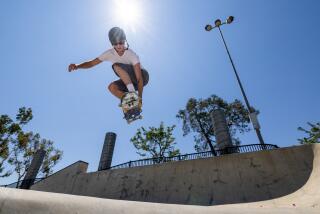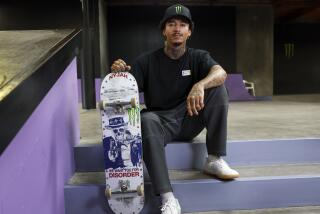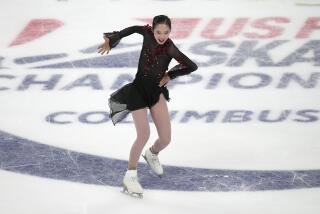Sochi Games: Why donât figure skaters get dizzy?
Are you a casual fan of figure skating and have some questions after watching it during the Sochi Olympics? Former competitive figure skater Laura E. Davis, the deputy mobile editor for The Times, has some answers.
1. Why donât figure skaters get dizzy?
It may look like the jumps and spins that figure skaters do would make them so dizzy they would fail a DUI test, much less be able to continue delicate tricks on ice. But spinning that fast doesnât throw you off like spinning slowly does. Everything around you becomes so blurry that you canât focus â itâs almost like you donât really see anything. The faster you spin, the less dizzy you get.
2. The Axel jump has an extra half-turn
You might hear a lot of talk about the Axel jump. At the Olympics this year, itâs a big deal that Japanâs Mao Asada is attempting a triple Axel. But why? Most of the ladies can do triples, so why canât they all do triple Axels?
An Axel is the only jump in which skaters take off forward and land backward. So the triple Axel is 3½ rotations in the air instead of just three like the other triples. As you might imagine, it has the highest difficulty rating of all the jumps. (The others, in order of difficulty rating from easiest to hardest are: Salchow, toe loop, loop, flip, Lutz.)
3. There are âleft-footedâ and âright-footedâ skaters
Most figure skaters land all their jumps on their right foot and mainly spin on their left foot. But there are some who do it the other way around â they land on the left foot and spin on their right (actually, both types of skaters spin on both feet, but there is a dominant foot). This means that everything they do on the ice is the mirror image of what âright-footedâ skaters are doing.
4. Whatâs special about the shoes competitive skaters wear?
Itâs more than just color that separates rental shoes from the white or black shoes you see the skaters on TV wearing during the Olympics. Figure skaters usually have their shoes custom-made; I remember putting my foot in a Styrofoam-like mold before ordering my shoes. These shoes are also a lot more supportive, and the upper portion has gel-like padding that makes room for your ankles after you wear them in a bit. You order the blades separately â and they have bigger toe picks than the ones on rental skates.
Skaters also get their blades sharpened, and they take steps to make sure they stay sharp and donât rust. Which brings me to my next point...
5. Figure skaters donât walk around on their blades off the ice
You might notice after you see a skater get off the ice that she puts something on the bottom of her skates. Theyâre guards that protect the blades from residue and other hazards on the ground that could dull them. When they take off their skates, they wipe them down then put soft towel-like guards on them that absorb the moisture the melting ice leaves. This helps keep them from rusting.
Have more figure skating questions? Tweet me and Iâll try to answer them: @lauraelizdavis
ALSO:
U.S.-born Vic Wild wins gold for Russia in snowboarding
Anze Kopitar, Slovenia can feel proud despite loss to Sweden
Sochi Games: Things I learned as a competitive figure skater
More to Read
Go beyond the scoreboard
Get the latest on L.A.'s teams in the daily Sports Report newsletter.
You may occasionally receive promotional content from the Los Angeles Times.







